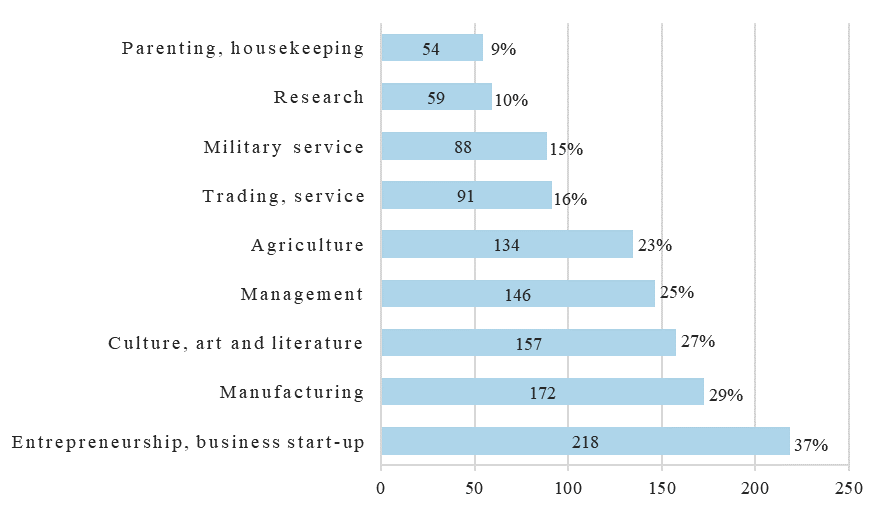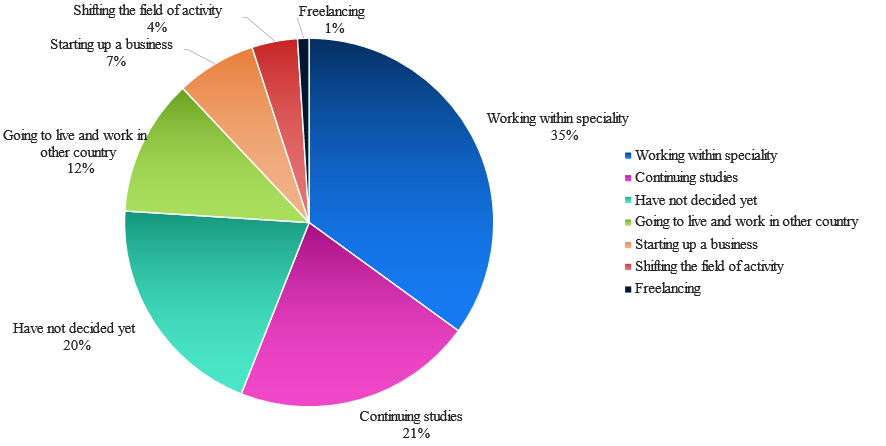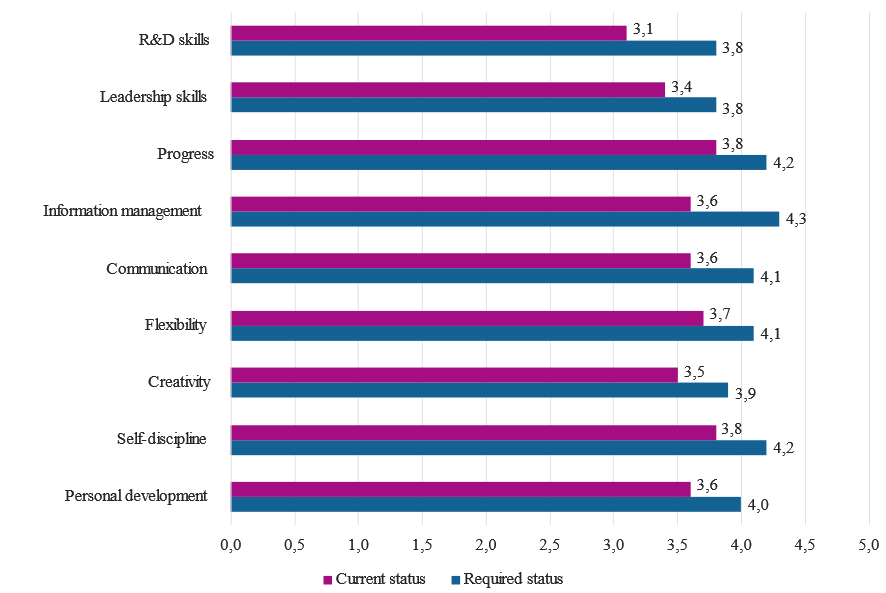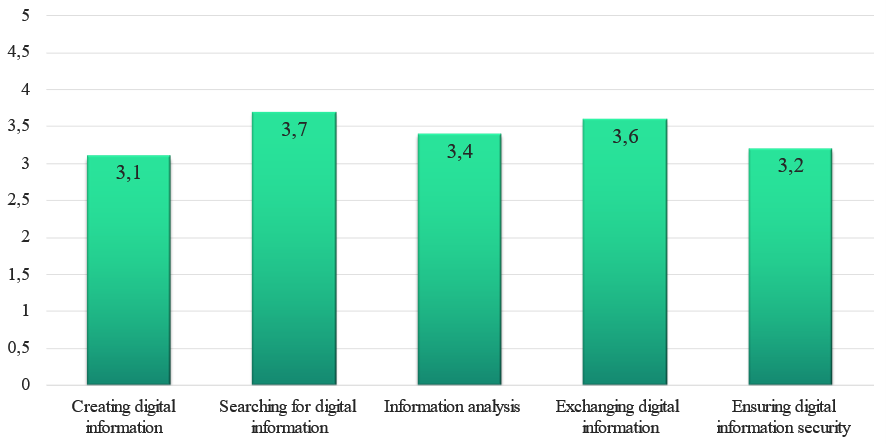Abstract
The paper unveils discrepancies between labor interests, future plans of rural youth and opportunities, conditions provided by the labor market in the Agro-Industrial Complex (AIC). A survey identified the way the chosen profession and field of activity is relevant to the interests and future plans of modern rural youth, as well as the main reasons for the youth’s unwillingness to have a degree-related job, in the field of agriculture and in rural areas. The reluctance of young people to work in the agrarian sector is thought to be due to dissatisfaction not with the job as such, but with the state of this sphere, backwardness of technologies, low efficiency of the industry, and unsatisfactory living conditions in rural regions. The involvement of agriculture in digital ecosystems can return the attractiveness of this sphere for young people. Young people willingly and quickly absorb digital technologies, but for their successful use in practice they do not fully possess the required basic and supra-professional (universal) competences and skills that are not properly developed in the conditions of large flows of information, digital communications and the need for “lifelong learning”. The paper is concerned with students’ self-assessment of significance and development of such competences and skills as analysis, creation, and evaluation of reliability of the information received, critical and systemic thinking, and building effective business communications. Mastering the necessary digital and general competences is viewed to be in conflict with clip thinking and the effect of communicative destruction.
Keywords: Digital ecosystem, digital competences, professional self-determination, universal competences
Introduction
AIC digitalization is chiseled due to the digital divide, as well as other constraints. Digital technologies are used by single business entities, mainly large corporations, not only because of their great financial capabilities, but also because of their greater awareness of the need and prospects of this process. The bulk of agricultural producers view AIC digitalization rather narrowly, reducing the whole process to robotization and automation of production. This determines the reluctance of the population to accept accelerated digitalization of both the industry and the economy as a whole, sought not by the RF government alone, but other countries as well. However, the recent events related to the COVID-19 pandemic have given impetus to rethinking digitalization processes. Due to the vital importance of agricultural output, it was not stopped, but had some disruptions in its value chain. Due to the fact that conventional communication methods have become dangerous, it became necessary to transfer them to an online format, which exacerbated the digital divide of both the 1st (accessibility) and 2nd (use) orders.
Currently, the challenge is not only to automate the entire chain of production and business processes, but also to integrate into a single ecosystem all participants in the agro-industrial cycle (from resource providers to end consumers) based on digital platforms and communications.
The creation of a digital ecosystem in the agrarian sector is particularly relevant today and can bring back the interest of the younger generation in agriculture. Digitalization processes that have embraced all spheres of society and agriculture are perceived by young people as a natural necessity. According to some experts (Davletshin & Trofimov, 2018; Orlova et al., 2020; Volkova, 2020; Voronin et al., 2019), digitalization of the industry will boost production, reduce costs, simplify the production chain, eliminate unnecessary intermediaries, and increase the level of control over numerous parameters of agricultural production. Increased production efficiency, new digital technologies and career prospects should attract young people to the agrarian sector of the economy. In addition, it is young people who have great capital in building and operating a digital ecosystem.
Problem Statement
A question comes up as to what unique characteristics the process of professional self-determination of young people has in the process of digitalization of agriculture. Digitalization of the industry changes the requirements for future personnel, and creates a demand not only for the development of digital, but also general, universal competences. The problem is insufficient attention paid to mastering ICT and professional communication skills.
Research Questions
The subject of research is the process of changing the future plans and labor interests of rural youth in the context of digitalization of agriculture, the formation of digital, general and universal competences.
Purpose of the Study
The paper aims to study the issues of professional self-determination of rural youth in the context of digitalization of agriculture.
To achieve this goal, the following tasks were solved.
- To identify the way the chosen profession and field of activity is relevant to the interests and future plans of modern rural youth.
- To define the main reasons for the youth’s unwillingness to have a degree-related job, in the field of agriculture. To find out what can influence the desire of rural youth to live and work in rural areas.
- To assess the level of digital, general and universal competences, demanded in digital ecosystems, among students of Omsk State Agrarian University who came to study at university from rural regions.
Research Methods
A methodological basis was formed by the publications of Russian and foreign scientists dedicated to digitalization of the economy: Lapidus (2019), and digitalization of the agro-industrial complex: Chulok (2019), Lazko et al. (2018), Orlova et al. (2020), Volkova (2020) and others. The study was facilitated by the publications concerned with the issue of mastering digital, universal and universal competences that are relevant in the digital economy: Davletshin and Trofimov (2018), Lapidus (2019), Shumakova et al. (2020), Shornikova (2019). The development of competences and adaptation of young people to the modern labor market in the context of digitalization is explored through the publications of Brodovskaya et al. (2018), Semenovskikh (2014).
To test the hypothesis and fulfill the tasks set, a sociological study was conducted based on an online questionnaire involving 1188 students (of which 591 people were rural youth). The feedback was processed through a factor analysis using the SPSS Statistics Software version: 24.0 trial. The results showed that the Bartlett criterion was 0.8.
Findings
Modern young specialists are not eager to be employed in industries with backward technologies, with a high proportion of physical, dirty and low-paid labor. According to surveys (Chulok, 2019), modern students dream of working in high-tech IT companies that care about ecology and environment protection. Subsequent upon the involvement of agriculture in digital ecosystems, the industry that was far from digitalization and unattractive for highly qualified young personnel started to seek for specialists from the fields of Big Data, Data Science, mathematics, analytics, and robotics. Digitalization of agriculture, Agriculture 4.0 (Orlova et al., 2020), meets the needs and perceptions of the employment by future young specialists and professionals.
At present, agrarian occupations are far from being the most attractive type of activity even for students of agricultural HEIs. A survey conducted at Omsk State Agrarian University shows that 49.4% of the surveyed university students arrived to study at university from rural areas, of which only 14% are going to go rural after graduation (while 33% of rural students have not made up their minds yet). Although 83.4% of the respondents agree that the chosen profession is interesting and relevant to their future plans.
However, if there are opportunities, rural students of Omsk State Agrarian University, of the preferred types of activity (Fig. 01),rank first entrepreneurship and starting their own business (218 students, 37%), second –jobs in the field of non-agricultural production, i.e. manufacturing, construction, etc. (172 students, 29%), third –jobs in the field of culture, art and literature (157 students, 27%), fourth – managerial activities (146 students, 25%), and only fifth – in agriculture (134 students, 23%).

These results are ambiguous. On the one hand, they demonstrate a low percentage of those willing to work in agriculture, but a higher percentage of those willing to be engaged in entrepreneurship. This is a positive trend that needs to be actively developed among young people, since it is young entrepreneurs who will play a crucial role in digitalization of the agrarian sector (Trendov et al., 2019). This is due to the fact that the opportunities for cooperation and innovation that open up through digital technologies coincide with the motives of modern entrepreneurship, like striving for stability, success, craving for something new, advanced, and progressive (Avlasovich et al., 2019).
As for plans after graduation, 35% of the respondents plan to work in a field related to their diploma, 21% want to continue their studies after graduation (Figure 02) and 20% have not decided yet.

Such results, on the one hand, may indicate that students want to improve their level of competence; on the other hand, they confirm a special phenomenon of modern youth, referred to in scientific literature as “protracted maturation”. In addition, a 1% rate of those willing to work as freelancers debunks the myth of the younger generation’s inclination to flexible employment.
The survey showed a discrepancy between labor interests, future plans of young people and opportunities, conditions provided by the labor market in the agrarian sector. The interviewed agricultural students are satisfied with their chosen profession (90% of students believe that the chosen profession brings real benefits to people and will allow them to achieve recognition and respect), but they are not satisfied with the state of the field, pay, working and living conditions. The reluctance to work within their specialty among 29% of respondents is associated with the lack of appropriate jobs, 24% – with low payment, 10% – with poor working and living conditions.
Modern students dream of working in high-tech industries that, inter alia, care about ecology and environmental issues. The involvement of the agrarian sector in digital ecosystems can boost the industry and make it more attractive for young professionals and highly qualified personnel who can count on higher salaries.
Of the respondents, 52.1% believe that the desire of university graduates to work in the country can be influenced by decent payment, 15.4% – by good, modern working conditions (equipment, digitalization, etc.), 11.8% – by housing provision, 9.3% – by career prospects.
The integration of digital technologies in agriculture is changing the requirements for future workers, highlighting competences that are different than before. It is not only computer literacy and ICT skills that young people successfully and eagerly master. Modern domestic and foreign researchers for the Industry 4.0 model consider “data analysis”, the presence of “critical thinking”, the ability to solve problems in a complex manner as the key competences (Lapidus, 2019; Shornikova, 2019). In a digital ecosystem, analytical skills must be combined with universal competences of interpersonal cooperation, effective, flexible, creative digital interaction and building professional communication.
OSAU students also consider “information management” to be the most important competence of the digital economy (Figure 03): the average assessment of the need for this skill is 4.3 points. In terms of the frequency of assessments, students rank this skill first and score 5. Whereas the majority of students score 4 for this competence, and the average assessment of the development of this competence is only 3.6 points, in terms of the frequency of 5-point assessments, the development of this skill among students is only ranked fifth (see Figure 3).

Among the agricultural students surveyed, to the question: “To what extent do you have these (digital) competences?” (Figure 04), the majority scores 5 for their skills in “searching for digital information”, this skill is ranked first as the most mastered by young people (average score 3.7), and a slightly smaller number of people also score 5 for the skill of “exchanging digital information” (2nd place). The mastery of “information analysis” skill is rated by the agricultural students rather low, on average by 3.4 points (3rd place). The lowest scores were given to the skills of “ensuring digital information security” (on average – 3.2 points, 4th place) and “creating digital information” (on average – 3.1 points, 5th place).

Searching in the abundant stream of various data, young people in voluntarily give preference to non-verified, but colorful and vivid information (video, pictures, simple text, highlighted and structured), and ignore analysis and thorough exploration due to abundance of dazzling data. Many researchers, including E. Toffler, F.I. Girenok, A.B. Feldman, K.G. Frumkin, T.V. Semenovskikh et al. (Semenovskikh, 2014) outline the problem of young people’s clip thinking, which is characterized by fragmentation, discontinuity, lack of consistency, and superficial perception of the information received. Features of clip thinking come into conflict with the skills of deep and critical analysis, information selection. Young people willingly and quickly master and absorb digital technologies, but do not have adequate universal “information management” competence to use them easily in practice.
In addition, modern studies cast light on the so-called “effect of cognitive reduction” (Brodovskaya et al., 2019), consisting in the uncritical attitude of young people to the selected information, in the inability to adequately assess the reliability and importance of abundant data used, which makes the younger generation susceptible to manipulation and deception.
For digital ecosystems based on the mutually beneficial interaction of all participants, general professional communicative competence, the ability to effectively collaborate in digital interaction, and the skill of teamwork are of particular importance (Lapidus, 2019). OSAU students rate high communication as a competence particularly important for a digital economy specialist (3rd out of nine) after self-discipline (1st) and flexibility (2nd).
Rating the need for universal skills that support competitiveness in the digital economy, students rank the skill of working with people only sixth (5 points on a five-point scale), and the skill of cross-sectoral communication – thirteenth. They value their ability to work with people very highly – ranked 2nd, i.e., the majority of students consider this skill to be almost mastered, and the mastery of cross-industry communication skill ranks 14th.
The overestimated self-assessment of the skill of working with people can be due to the fact that young people, being the generation of “digital natives,” possess “innate” skills of digital interaction, polycommunication. On the other hand, the younger generation Z does not accumulate experience of interpersonal, numerous professional communications. The problem is that social media communication is significantly different from professional, business communication that requires joint decision-making.
Modern findings (Brodovskaya et al., 2019) point to the “effects of communicative destruction” characteristic of modern youth in the context of digitalization and polycommunication. The effects can be seen in significantly weakened business communication skills, in lost respect and blurred boundaries of communication, decreased joint decision-making.
With active cooperation of participants in the digital ecosystem, the exchange of innovations, advanced solutions that are rapidly changing technologies and generations of technology is accelerating. In these conditions, young people need to be ready for lifelong learning, as well as professional mobility, flexibility and the ability for self-learning and mastering new professions. The survey suggests that not all rural students are familiar with modern agricultural professions. Among the rural students surveyed, 50% of the respondents believe that they have a clear idea of what the profession of an agricultural ecologist involves, an agronomist-economist – 47%, a logistics operator – 41.7%, an operator of automated agricultural machinery – 38.6%. Moreover, a significantly smaller number of students are familiar with new professions, the development of which is relevant for AIC digitalization, such as a PR manager (22%), a GMO agronomist (22.1%), an agroprogrammer (12.1%), a city farmer (10.2%), agrocybernetist (6.6%).
Dr. John Sullivan, American Ambassador to Russia, considers lifelong learning to be “the only important competence” in the face of constant changes, rapid “half-life of competences” and obsolescence of knowledge gained at university (Lapidus, 2019).
Lifelong learning, flexible and interdisciplinary, almost continuous is required. Young people, being the most mobile and susceptible to innovations part of the population, generally have a positive attitude towards the need for continuous education. Agricultural students do not rate high the importance of self-learning competence in the digital economy (5th out of nine), and flexibility (6th), after information management competences (1st), progress (2nd), self-discipline (3rd), communications (4th).
It is noteworthy that OSAU students rate very high the level of flexibility mastered (2nd out of nine), however, the competence of self-development in this series takes only a modest 7th place.
Thus, digitalization processes create both new opportunities and contradictions in the implementation of the labor, creative and managerial potential of modern youth.
Conclusion
The study discovered that for the majority of rural students the chosen profession is interesting, relevant to their abilities and future plans, and is valued as significant, allowing them to achieve recognition and respect. The reluctance to work within a specialty and return to rural is due to the inconsistency between young people’s needs and the state of the field of activity, pay, working and living conditions. Based on the identified opinion of rural students, the willingness of university graduates to work in the countryside can be influenced by decent wages, good, modern working conditions (equipment, digitalization, etc.), housing provision, and career prospects.
Creating digital ecosystems has the potential to change young people’s attitudes towards agriculture as its digitalization meets the needs and interests of future young specialists and professionals.
Comparison of domestic and foreign scientific and practical research, as well as survey feedback involving OSAU students suggest those skills, abilities and competences that will become priority for young people in digital ecosystems. These are the competence of working with information, first of all, “data analysis” and the presence of “critical thinking”, general professional communicative competence, i.e. the ability to effectively cooperate in the context of digital interaction, as well as the readiness of young people for lifelong learning, professional mobility and self-learning.
The features of clip thinking and the inability of young people to critically assess the flow of information conflict with the skills of deep and critical analysis, selection, security and digital information creation. The skill of working with people, otherwise known as communicative competence, has an overestimated self-assessment among young people.
Meanwhile, researchers highlight the “effects of communicative destruction” characteristic of modern youth in the light of digitalization and polycommunication, which does not foster effective professional communication.
For qualitative shifts in the process of involving the agrarian sector in the digital ecosystem, it is important to pay attention to the development of general and supra-professional (universal) digital competences.
Due to the fact that the study was carried out before a forced transfer to distance learning, it is necessary to continue it in order to determine the degree of rethinking of the digitalization process by young people and their readiness for further work in new conditions.
Acknowledgments
The study was supported by the Russian Foundation for Basic Research within research project No.19-29-07366.
References
Avlasovich, E. M., Gefner, O. V., Vasyukova, M. V., & Kuznetsova, O. Z. (2019). Motivation as a factor in the formation of human capital with rural entrepreneurship. Proceedings of the International Scientific Conference The Fifth Technological Order: Prospects for the Development and Modernization of the Russian Agro-Industrial Sector (TFTS 2019). DOI:
Brodovskaya, E. V., Dombrovskaya, A. Y., Pyrma, R. V., Sinyakov, A. V., & Azarov, A. A. (2018). The relationship between the value and competence choices of young people in the context of digitalization: results of the All-Russian study Values and Meanings. 2. https://cyberleninka.ru/article/n/vzaimosvyaz-tsennostnogo-ikompetentnostnogo-vybora-molodezhi-v-usloviyah-tsifrovizatsii-rezultaty-vserossiyskogo-issledovaniya-2018
Brodovskaya, E. V., Dombrovskaya, A. Y., Pyrma, R. V., Sinyakov, A. V., & Azarov, A. A. (2019). Effect of digital communication on the development of professional culture of Russian youth: the results of a comprehensive applied study. Monitoring Public Opinion: Economic and Social Changes, 1, 228-251. DOI:
Chulok, A. (2019, March 1). The PC of the future. An insight into agriculture through the prism of Big Data analysis. Agroinvestor. https://www.agroinvestor.ru/analytics/article/31304-apk-budushchego/
Davletshin, I., & Trofimov, A. (2018, September 18). Digital redistribution. Advantages and risks of digitalization of agriculture. Agrotechnics and technology. https://www.agroinvestor.ru/technologies/article/30405-tsifrovoy-peredel/
Lapidus, L. V. (2019). Digital Economy Competence Center. http://www.makonews.ru/centr-kompetencij-cifrovoj-ekonomiki/
Lazko, O. V., Semchenkova, S. V., & Lukasheva, O. L. (2018). Strategic guidelines for managing digital transformation processes in the agro-industrial complex. Moscow Economic Journal, 4, 507-518.
Orlova, N. V., Serova, E. V., & Nikolaev, D. V. (2020). Innovative development of agro-industrial complex in Russia. Agriculture 4.0 report to XXI April international scientific conference on The Problems of Economic and Social Development Moscow HSE University, 128.
Semenovskikh, T. V. (2014). The phenomenon of “clip thinking” in HEI learning environment Bulletin of Eurasian Science, 5(24). https://cyberleninka.ru/article/n/fenomen-klipovogo-myshleniya-v-obrazovatelnoy-vuzovskoy-srede
Shornikova, N. Y. (2019). Development of necessary competences among students – future workers of digital society, Issues of Modern Education. https://cyberleninka.ru/article/n/formirovanie-neobhodimyh-kompetentsiy-u-studentov-buduschih-rabotnikov-tsifrovogo-obschestva
Shumakova, O., Kryukova, O., Kosenchuk, O., & Mozzherina, T. (2020). The Influence of a Resource and Competence Centre on the Multifunctional Development of Agriculture. Proceedings of the International Scientific Conference The Fifth Technological Order: Prospects for the Development and Modernization of the Russian Agro-Industrial Sector (TFTS 2019). (Vol. 393, pp. 240-247). Atlantis Press, Series: Advances in Social Science, Education and Humanities Research.
Trendov, N. M., Varas, S., & Zeng, M. (2019). Digital Technologies Serving Agriculture and Rural Areas.Background paper, Food and Agriculture Organization of the United Nations, Rome. http://www.fao.org/3/ca4887ru/ca4887ru.pdf
Volkova, A. A. (2020). Digitalization as a way of enhancing innovation in agriculture. Young Scientist, 2, 244-246.
Voronin, B. A., Mitin, A. N., & Pichugin, O. A. (2019). Management of digitalization processes in agriculture in Russia Agrarian Bulletin of the Urals, 4(183), 86-95.
Copyright information

This work is licensed under a Creative Commons Attribution-NonCommercial-NoDerivatives 4.0 International License.
About this article
Publication Date
01 July 2021
Article Doi
eBook ISBN
978-1-80296-112-6
Publisher
European Publisher
Volume
113
Print ISBN (optional)
-
Edition Number
1st Edition
Pages
1-944
Subjects
Land economy, land planning, rural development, resource management, real estates, agricultural policies
Cite this article as:
Skosyreva, N. D., Revyakina, Y. N., Avlasovich, E. M., Vasyukova, M. V., & Agafonov, A. L. (2021). Digitalization Of Agriculture As A Driver For Professional Self-Determination Of Rural Youth. In D. S. Nardin, O. V. Stepanova, & V. V. Kuznetsova (Eds.), Land Economy and Rural Studies Essentials, vol 113. European Proceedings of Social and Behavioural Sciences (pp. 125-134). European Publisher. https://doi.org/10.15405/epsbs.2021.07.16

